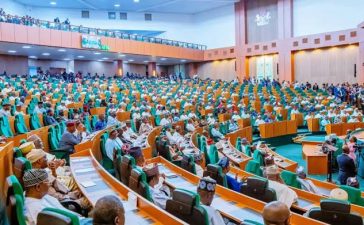Nigeria’s total public debt has surged to N144.67 trillion ($94.23 billion) as of December 31, 2024, reflecting a significant 48.58% increase from N97.34 trillion ($108.23 billion) at the end of 2023. The latest report by the Debt Management Office (DMO) highlights a continuous rise in the country’s debt burden, with a quarter-on-quarter increase of 1.65%, up from N142.32 trillion ($88.89 billion) recorded at the end of September 2024.
The sharp rise in public debt was driven by substantial increases in both external and domestic borrowings. Nigeria’s external debt soared by 83.89%, climbing from N38.22 trillion ($42.50 billion) in December 2023 to N70.29 trillion ($45.78 billion) in December 2024. This surge was largely attributed to new foreign loans and the depreciation of the naira, which escalated the naira-equivalent value of dollar-denominated debt.
Domestic debt also witnessed a rise, increasing by 25.77%, from N59.12 trillion ($65.73 billion) in December 2023 to N74.38 trillion ($48.44 billion) by the end of December 2024. The Federal Government’s domestic debt component grew significantly by 32.19%, from N53.26 trillion to N70.41 trillion, reflecting its continued reliance on local borrowing to finance budget deficits and infrastructure projects.
Conversely, domestic debt owed by states and the Federal Capital Territory (FCT) declined by 32.27%, falling from N5.86 trillion to N3.97 trillion, signaling a more cautious approach to borrowing by subnational governments in the past year.
On a quarter-on-quarter basis, Nigeria’s total public debt increased by N2.35 trillion, translating to a 1.65% rise from the N142.32 trillion recorded in September 2024. External debt rose by N1.4 trillion, from N68.89 trillion ($43.03 billion) to N70.29 trillion ($45.78 billion), driven by new foreign loans and the continued weakening of the naira. Domestic debt also saw a modest increase of 1.29%, from N73.43 trillion ($45.87 billion) in September 2024 to N74.38 trillion ($48.44 billion) by December.
As of December 2024, external debt accounted for 48.59% of Nigeria’s total public debt, while domestic debt made up 51.41%, reflecting a relatively balanced debt structure. However, the growing reliance on external borrowings raises concerns about Nigeria’s vulnerability to exchange rate fluctuations and global economic shifts.
Economic analysts have expressed concerns about the impact of the rising debt on Nigeria’s fiscal stability, especially given the sharp increase in external debt. The depreciation of the naira and the growing cost of servicing foreign debt could place further strain on the country’s financial resources, with potential long-term implications for its economy.







